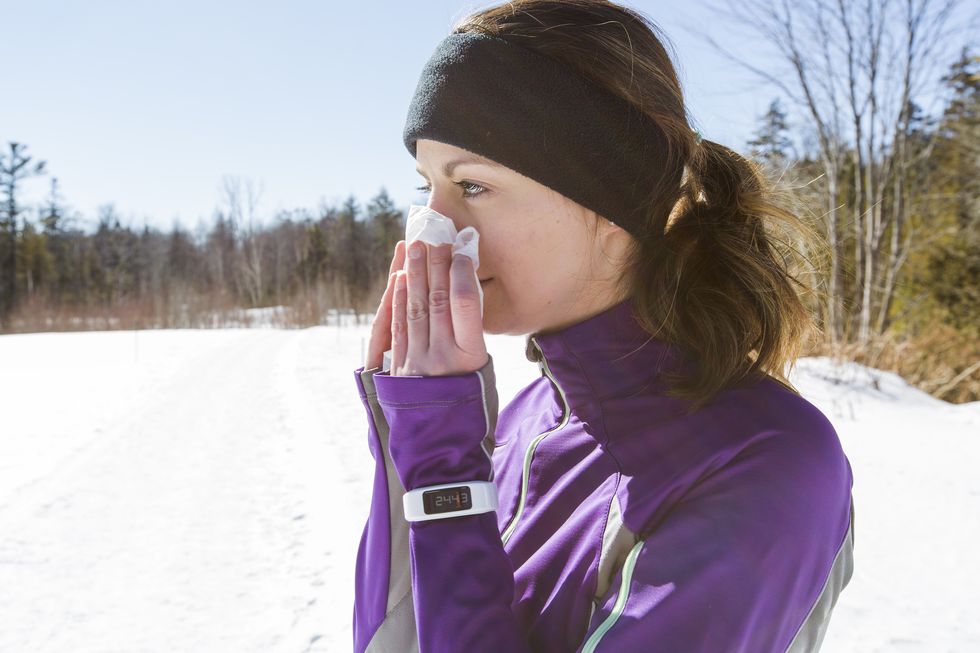
These days, whenever you cough, have a runny nose, wake up with a sore throat, or you generally feel under the weather, your first thought may be “Do I have COVID-19?”
First things first—closely monitor your symptoms. If you start to feel any shortness of breath or have difficulty breathing, start to lose your sense of taste or smell, or have been somewhere where you could have possibly contracted COVID-19, get tested.
If your doctor (or a test) confirms you don’t have the virus, the next suspect may be the common cold—an upper respiratory infection that is typically caused by a viral infection and is associated with symptoms like a runny nose, sore throat, and cough.
Colds are the result of the immune system being activated, explains Cordelia Carter, M.D., director of the Women’s Sports Medicine Center at NYU-Langone in New York.
“This ‘activation’ directs immune cells to migrate to the site of infection, to recruit and produce other cells and proteins to help fight the infection, and to prevent reinfection with the same bug in the future,” Carter says.
In other words, your body is using energy by supporting your immune system to fight off the cold. And the amount of energy your body needs to fight an infection is dependent on the type of infection you’re trying to stave off and how severe it is.
During “normal times,” runners often thought they could run through a cold. But with things changing daily, it’s probably best to rest considering many symptoms of COVID-19 match those of a common cold. (See table below.)
COVID-19 Symptoms
According to the CDC, people with these symptoms may have COVID-19. If you suspect you have COVID-19, stop exercising and get tested.
» Fever or chills
» Cough
» Shortness of breath or difficulty breathing
» Fatigue
» Muscle or body aches
» Headache
» New loss of taste or smell
» Sore throat
» Congestion or runny nose
» Nausea or vomiting
» Diarrhea
Is Running Good for a Cold?
Every person, infection, and running or training situation is unique, and these decisions should be individualized, taking said factors into account, Carter advises.
“It is generally okay to run with a cold, but it makes sense to scale back your typical duration, frequency, and intensity of it,” she says. If you decide to run, keep the pace easy and stick to shorter distances.
Many runners find that running with a head cold actually makes them feel better—at least temporarily. Though it’s not an exact science, running can help with some cold symptoms because exercise releases adrenaline also called epinephrine, which is a natural decongestant.
“Running may decrease some of the congestion in the nose and sinuses, and you will still feel that natural endorphin high when you’re finished,” Carter says.
Carter adds that if you have a pre-existing condition that affects your lungs like asthma, and you know that running might exacerbate this while you’re fighting off a cold, then it’s a good time to consider a lower-intensity exercise. Try light yoga or a brisk walk. And keep in mind that research in 2020 has shown that if your symptoms are COVID-19, and you do try to workout through that, you may be putting your health in danger.
When to Take a Rest Day
One common bit of general advice has been the “neck rule.” Symptoms involving the neck and below—sore throat, cough, chest congestion, bronchial infections, body aches, chills, vomiting, diarrhea, or swollen glands—require time off from running. (Especially now, to step the spread of any virus.) Symptoms above the neck—a runny nose, stuffiness, or sneezing—generally don’t require time off.
Additionally, if you’re feeling weak, faint, or short of breath, these symptoms should prevent you from exercising or running.
“Not being able to sustain sufficient liquid intake to keep yourself adequately hydrated or to replace the energy used during an exercise session are also reasons to skip a workout,” Carter says.
Symptoms such as high fevers, a productive cough, muscle aches, decreased appetite, and associated gastrointestinal or GI issues aren’t typical of a common cold and shouldn’t be ignored just to log kms. So, if you have a cough that means you should skip a few workouts and let your body rest.
In the end, Carter recommends considering your goals and whether any risks of working out while you’re sick are worth the benefits you may reap from doing so. “Taking time off allows your body to focus on fighting infection rather than on expending energy on physical activity performance and recovery.”
Choose the path that will lead to the fastest recovery, even if that means spending the day on the couch.